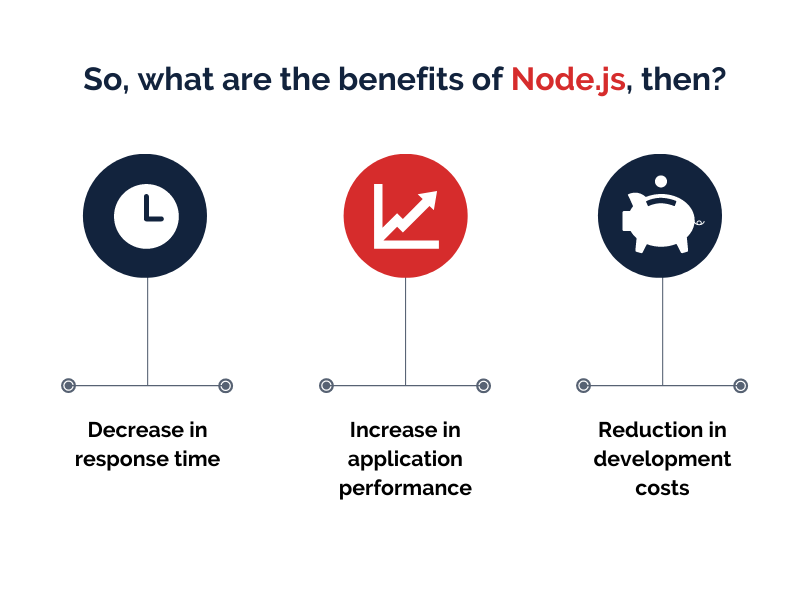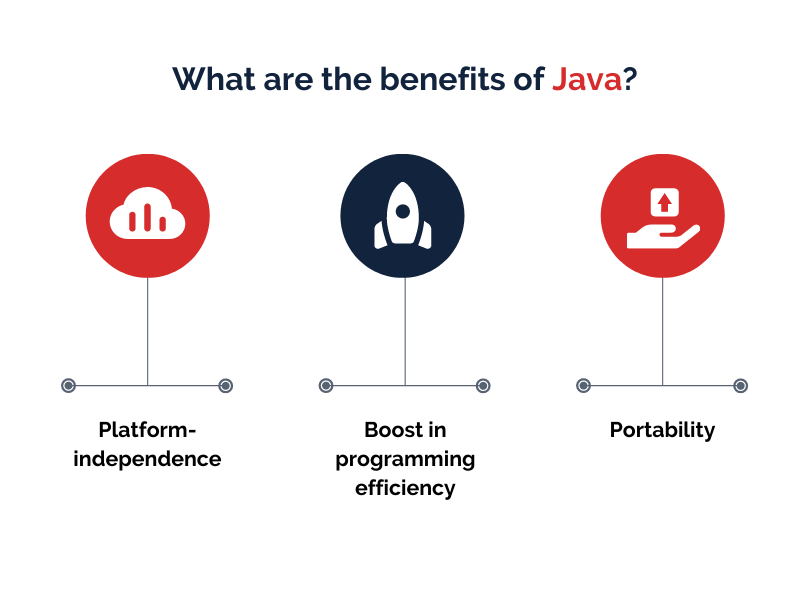Node.js vs. Java: Choosing the Best Option for Your Business in 2024

What to choose: Node.js or Java? Why use Node.js instead of Java, or vice versa? Do you ask these questions frequently? Node.js is undoubtedly one of the most popular frameworks for real-time applications since it helps develop fast, cross-platform, and scalable projects. It keeps on representing the competition in 2024 by encouraging startups worldwide to opt for it over many other technologies, such as third-party library tools, for backend development. That is why, despite the fact Node.js was introduced back in 2009, it continues to occupy leading positions in the programming world.
Also, we should not forget that Java plays a crucial role in the current programming world too. It may be related primarily to its main slogan: “write once, run anywhere.” In other words, the biggest reason this language is popular among developers and programmers (as well as for scientific applications) is its platform-independence. Java can be used to develop end-to-end mobile and desktop apps for different operating system servers. For this reason, we see an abundance of Java-based apps on the market.
So, what technology is better in 2024? Let’s find out together by taking an in-depth look into the main features of both Node.js and Java as well as their advantages and disadvantages.
Definition of Node.js
To begin with, Node.js is a massive open-source tool with a strong community of developers. To be precise, Node.js is a server-side, JavaScript-based runtime environment (neither a library nor a framework, as many sources indicate) introduced back in 2009 by Ryan Dahl.
Node.js is based on Chrome V8, which is a third-party tool created by Google for its Chrome browser project. So, here, JavaScript calls are translated into machine code. On the whole, the main principle of this backend platform is to execute JavaScript code outside a browser. A Node js based app intends to establish a two-way connection between the server and the user’s browser. This way, low latency and high throughput can be achieved during code execution.
Pros and Cons of Node.js
So, what is the benefit of using either Node.js or Java, then?
Let’s start with Node first. There are at least three massive benefits of Node.js:
- decrease in response time
- increase in application performance
- and reduction in development costs

It looks like those benefits explain the popularity of Node.js, isn’t it? In brief, this backend platform has become an actual trend due to its wide range of capabilities for application development.
On top of that, Stack Overflow Research concluded that Node.js remains the leader among other frameworks (both of JavaScript-based nature and in general). Such statistics prove that Node.js is worth learning.
Yet, there are some tools in the npm registry that might be not properly documented, preventing an average user from making an informed decision about app security.
What is a better way to use Node.js? Let’s look at use cases of Node.js because this technology has lots of them. Here, you can see the main areas in which Node.js can be applicable:
- Streaming web apps
- Real-time software & streaming apps
- Microservices
- Android apps
- Complex single-page apps
- Complex web applications
- IoT-based apps
- Developing APIs
- Backends and servers
- CMS, content publishing
- Online marketplace and stores
- Message Servers and Event Broadcasting
- Industrial automation
- Scripts, CLI (command-line interfaces), and many more
What is Java?
To begin with, Java is an object-oriented programming language (unlike Node.js, Java is a statically-typed and secure language). Java was created by Patrick Naughton and James Gosling back in 1991. However, at that time, this programming language was known as Oak and then as Green at that time.
Here, it is necessary to consider that Java will celebrate its 29th anniversary in 2024. Anyway, Java is regarded as the most influential and widely used computer language worldwide. It’s great both for a novice developer and for an advanced expert.
Pros and Cons of Java
Now, let’s take an in-depth look into Java and its current rank since this technology has massive significance for developers too.
You may wonder why Java is so popular even after 29 years? Java attributes its success primarily to the fact that there are numerous applications written in Java. You can find both server-side applications and full-scale concurrent applications written in it. That is why, Java has become widespread in many popular projects, for example in finance.
What’s more, Java has been upgraded several times since 1991, so it has faced a significant boost in programming efficiency since that time. It had major upgrades to memory space and Java Virtual Machine. Moreover, Java is known for consistently running on any stage. That is why Java remains one of the most popular programming languages worldwide. It’s among the native languages of the web and mobile development.

Although there are many benefits of Java, this technology is believed to be slightly slower than Node.js both in terms of building applications and running them.
Before we start comparing Java and Node.js, we must consider the cases in which Java can be applicable to an average modular application. So, let’s take a look at the main ways of using Java:
- Android apps
- Web apps
- Server apps in financial services
- Big data
- Scientific apps
- Embedded systems
- Social media
- High-frequency trading spaces
- Software tools etc.
One fact that is obviously worthy of attention refers to the number of Java and Node.js jobs available on the market. So, as Indeed points out, there were more Java vacancies in demand (30272) than Node.js vacancies (7401) in 2019. Such a report indicates that the market requires more Java developers than Node.js developers for source code creation. Yet, there is still an extremely high demand for Node.js developers.
Node.js Vs. Java: Main Differences
So, now it’s time to compare Node.js and Java — two of the most popular technologies over the last couple of years. What is more relevant to use for app development in 2024? Let’s get a deep insight into the main benefits and drawbacks of Node.js and Java into the five most important categories. Here’s our Node.js vs. Java comparison:
Java vs. Node.js: Performance Comparison
Java is extremely fast in terms of its performance. However, compared to Node.js, is it faster? The answer is no. If you’re willing to create something like trading applications, Node.js is better. The main reason is primarily connected to its usage of compilers. On top of that, Java is known for its garbage collection function, which also can be both an advantage and a disadvantage at the same time. When it comes to Node.js, this technology is known for its no-buffering feature. Node.js simply outputs the data in chunks and so makes runtime much faster. Consequently, in this contest of performance characteristics, Node.js is an obvious winner.
Winner: Node.js
Result: Node.js 1 – Java 0
Cost of Development
The price for Node.js and Java developers isn’t drastically different. Even though Java development is considered to be slightly cheaper on the US market, the ending price of the product still depends on some other factors such as project complexity, management, etc. In this regard, the user community of both technologies doesn’t differ significantly. So, in this category, the winners are both technologies.
Winner: Both
Result: Node.js 2 – Java 1
Speed of Coding
Node.js is known for its flexibility; thus, it’s fast in development. Yet, Java is the exact opposite of Node.js since the first technology takes much more time to develop due to being a rigid language (though, Java may save time in the long term in some cases). If you want to create a mobile application, for example, Node.js is typically superior.
Winner: Node.js
Result: Node.js 3 – Java 1
Stability
In terms of stability, Java might claim its leadership here (because of the object-oriented approach and paradigms that were used for decades. But in the end, it’s mostly a matter of development and testing processes. Even the best coding platform can’t defend its users from some type-related error.
Winner: Java
Result: Node.js 3 – Java 2
Scalability
Both technologies can help create highly scalable applications. Still, one of the two technologies is known for better results in the given category. Java is better here since it allows native multithreading and parallel computing. Node.js apps also have this offer but they are not that well-settled. Their advantage in terms of traffic scalability is development speed but not execution speed.
Winner: Java
Result: Node.js 3 – Java 3
Testing
Without a doubt, testing is an essential part of the quality of your product. Both Node.js and Java are good in terms of testing. In the case of Node.js vs. Java competition, there are more ways to write code, and therefore, more ways to test it in Node.js/JavaScript. In the Java world, coding and testing approaches are more unified.
As a result, the Node.js vs. Java competition has no clear winner in the presented case. Java gets 1 point for having one clear way of doing things, whereas Node.js receives 1 point for variety.
Winner: both
Result: Node.js 4 – Java 4
Documentation
Concise and clear documentation is the prime feature of both Node.js and Java. Consequently, Node.js and Java offer their users’ data helping investigate functionalities of two technologies in-depth. In this category, both technologies gain 1 point each.
Winner: both
Result: Node.js 5 – Java 5
Node.js Vs. Java: Security
Here, the picture might look a bit different. The main threat to Java might be related to certain integrations. This means this programming language is usually not affected by the language’s design. In the case of Node.js, this technology is known for lacking default error handling, which is, without a doubt, a significant security issue (besides, you can read our recent article on Node.js security issues and their solutions. The Node.js vs. Java competition is obviously won by Java here.
Winner: Java
Result: Node.js 5 – Java 6
Community
As it was mentioned above, both Node.js and Java are two very popular technologies nowadays. So, they both have large developer communities. Even though the Java community is older, the number of Node.js developers increases each year. Consequently, Java and Node.js have many specialists who have profound knowledge and skills to work in their niche.
Winner: Both
Result: Node.js 6 – Java 7
Popular Applications Built with Node.js and Java
Developers around the world widely use Java and Node.js. This is why many popular applications were designed with the help of those two technologies. Let’s take a look at popular apps built either using Node.js or Java.
Popular Apps Using Node.js as Backend Technology
PayPal. The Web/API parts of the largest system for online payments in the whole world were built on Node.js for a reason. Node.js is the reason why the app has 33% fewer lines than otherwise, and it’s twice as fast with fewer lines.
Netflix. All web-facing parts were rewritten with Node.js (APIs mainly). With the help of Node.js, the startup time of the world’s leading subscription-based streaming service was decreased by almost 70%.
Other popular companies using Node.js for backend are NASA, Trello, LinkedIn, Uber, Twitter, eBay, and many others.
Popular Apps Using Java as a Backed Technology
As Java remains one of the most popular programming languages worldwide, it is known for having many products built using this technology.
Spotify. The main reason why one of the most popular audio streaming and media services providers opted for Java was to log and stabilize data transfer. Moreover, Java is the main technology for the company’s app on Android OS.
LinkedIn. In the case of the most popular business and employment-oriented online service, Java was used to implement messaging, recognize and convert links in texts, and for many other reasons as well.
Some other apps built on Java include Amazon, Uber, Minecraft, Paypal, Netflix, and others.
Prospects: Will Node.js Replace Java
Is Node.js still relevant to use in 2024? Will Node.js replace Java? The answer is that both Node.js and Java are great technologies with unique features. They all have pros and cons playing a significant part in the development process, and they’re bound to remain popular even in the future. Whether or not Node.js would replace Java would depend on the increase of the uses of Node.js among developers and its applications in real projects.
Conclusion
All in all, Java proved to have a more considerable advantage in some of the most critical categories in the development process. They are stability, scalability, and security. In the case of Node.js, this technology showed leadership in the development process in terms of performance and speed of coding.
Anyway, Node.js and Java are great technologies, and the decision on whether to choose one of them should be based on the use cases. Our company is ready to help you execute the product that will stand out in the market. So, get in touch with us, and receive help from a team of professionals.
FAQ
What are some of the popular applications built with the help of Java and Node.js?
Popular applications developed using Java encompass a wide range of domains, including enterprise software, Android apps, and scientific applications. Node.js, on the other hand, is commonly employed for real-time applications, backend development, and community-driven projects centered on JavaScript, focusing on customer satisfaction.
Do you think Java will ever replace Node.js?
It’s unlikely that Java will replace Node.js, as they serve distinct purposes. Java excels in memory-intensive scientific applications and enterprise software, while Node.js is preferred for real-time and event-driven tasks. Node.js vs. JavaScript interaction is perfect for web tasks. Java is better for creating something more focused on analyzing vast amounts of information.
Does Node.js have a performance advantage over Java?
Node.js can offer a performance advantage over Java in specific scenarios, especially for real-time applications and asynchronous tasks, due to JavaScript’s non-blocking nature. Java is more powerful in situations when there’s a need for larger memory space. These situations typically include various types of complex calculations.
What’s more popular: Node.js or Java?
Popularity varies depending on the context. Node.js is more prominent in web development and community-driven projects, while Java maintains a stronghold in enterprise applications and Android development.
Can you combine Node.js and Java?
Yes, it’s possible to combine Node.js and Java within a single app, leveraging their unique strengths. Node.js can handle real-time and interactive features, while Java is suitable for memory-intensive or complex computations, thanks to their interoperability via the Java Virtual Machine.
You can hire Node.js developers in Keenethics. So, do not hesitate to contact us to help you execute your project.

























